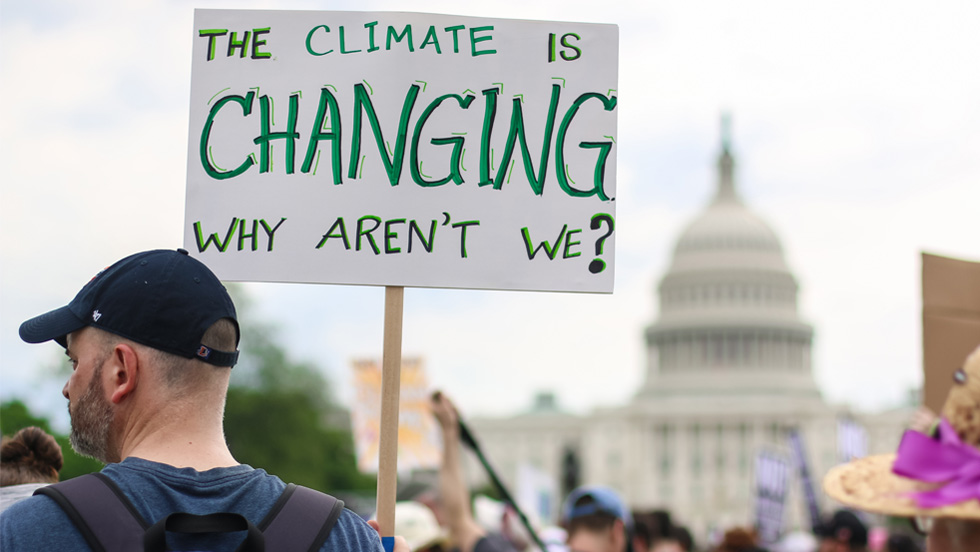
Climate change is a topic that surfaces each time there is news of the latest flood, forest fire, tornado or temperature extreme.
Yet a 2023 survey by Pew Research Center showed that 26 percent of people say warming is mostly caused by natural patterns in the environment while 14 percent do not believe there’s evidence the Earth is warming at all.
How can this 40 percent of people be convinced that climate change is real—and more importantly, that human activity is contributing to it? Alemtsehai Turasie, PhD, assistant professor in Adelphi University’s Department of Mathematics and Computer Science, believes that the only tool to convince those who deny the existence of climate change is to support our arguments with reliable evidence.
Dr. Turasie co-authored “More Accurate Climate Trend Attribution by Using Cointegrating Vector Time Series Models,” which was published in Statistics and Econometrics of Environment and Climate Change, a special issue of the journal Sustainability, and takes a new approach to modeling changes in our environment and attributing any changes detected to appropriate factors. He completed all the data analysis and produced the graphs used in the paper to indicate results.
According to the paper, detection-attribution studies assess whether detected climate changes are significantly outside the range expected from natural internal variability and “assess to what extent observed changes can be attributed to external forcings of climate change, both human-induced and naturally occurring.” However, the existing methods for detection and attribution are missing an important piece of the puzzle.
“Climate scientists use different methods—such as ordinary least squares regression and total squares regression—for detection and attribution of climate change,” Dr. Turasie said. “Unfortunately, these existing methods for detection and attribution are based on the assumption that the data used are stationary. The trouble with that is, most climate variables, like global mean temperature, are not stationary.”
Dr. Turasie and his co-authors, David Stephenson, PhD, of the University of Exeter and Donald Cummins, PhD, of Université de Toulouse, looked at the characteristics of the existing methods for measuring climate change and the real data available. They then designed this study as the first to evaluate the performance of existing methods and to then introduce a new method that can account for nonstationarity in the data.
After intensive data analysis, they found that the cointegrating vector autoregressive model of order 2, VAR(2), outperformed the existing methods in terms of all statistical criteria. In other words, Dr. Turasie says that their new VAR(2) model was found to be less biased and more precise, and therefore more accurate, than the existing methods.
With sustainable development efforts increasingly focusing on human-induced climate change, this level of precision is important in pinpointing specific factors and to what degree they contribute to observed climate trends—so that we can take steps to decrease them.
How Climate Science Research Can Impact the Future
The implications for this research are wide-reaching. Dr. Turasie says that climate change affects almost all sectors, and sustainability of these sectors heavily depends on accurate detection of changes—and strong policies to adapt the changes.
“Reliable detection and attribution of climate change is a key for policymaking and preparedness,” he said. “Use of the new method we proposed can help climate scientists to detect changes more accurately, and policymakers and investors to put adaptation tools in place for sustainable development.”
He adds, “If we can’t detect possible changes properly, we can’t be prepared. If we are not prepared, there is no sustainability. Accurate detection of climate change minimizes false positives and false negatives, allowing policymakers to allocate resources more efficiently and effectively.”
A Love for Statistics Becomes a Passion for Climate Change Research
Dr. Turasie grew up in a small rural village in Ethiopia, developing a love for statistics that led him to earn bachelor’s and master’s degrees in the subject from Addis Ababa University in Ethiopia. He is the first in his family to attend college.
After completing graduate school, Dr. Turasie began to feel drawn toward taking on some of our world’s pressing problems—and to use statistics to do so. His interest in weather and climate change, one of the largest global issues, seemed a natural fit. He embarked on doctoral studies at Exeter Climate Systems at the University of Exeter, focusing his research on the application of statistics to climate-related research and completing his PhD project under the supervision of an interdisciplinary team of renowned professors of statistics, climate science and economics.
Since joining the faculty of Adelphi University in Fall 2022, Dr. Turasie has continued exploring this research interest and making important contributions that have the potential to impact how we address the impacts humans are making on the environment.
“There is an old saying, ‘Without data, you are just another person with an opinion.’ Statistics makes sense out of data,” Dr. Turasie said. “Properly collected data are more genuine than many theories. Mathematics and statistics will always play an irreplaceable role in providing crucial evidence toward solving real-life problems and answering important questions.”